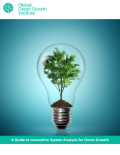
Effective water management is a crucial ingredient for green growth. It is becoming increasingly clear that astute investment in, and management of, water can help to drive green growth. To do this, governments must catalyse water-related investment and innovation that underspin sustained green growth and give rise to new economic opportunities. Drawing on recent OECD work on policies to support green growth, and on water economics and governance, this Policy Perspectives brochure lays out the opportunities to manage and invest in water as a means for green growth. This paper identifies the key policy options that governments can use to assist this transition towards greener growth.

This report is the first major output of a project on Water and Green Growth, led by the Government of the Republic of Korea and the World Water Council (WWC). It is the result of over 12 months of research and analysis by an international group of experts. It provides an analysis of 26 case studies that illustrate various aspects of water and green growth, and then uses the analysis to recommend a draft framework for policymakers.
The Europe 2020 Strategy has identified the key goal of smart, more inclusive and sustainable growth. In this direction, redirecting firms’ innovation activities towards ecological targets without hampering their competitiveness is of paramount importance. The double externality issue related to environmental innovations makes the policy intervention crucial in order to avoid sub-optimal commitment of resources to the innovation process and ensure the reduction of polluting agents emissions.

This paper presents novel empirical evidence on the internationalization of green R&D by multinational firms (MNCs), as measured by patents data. Using data on inventors’ addresses for the set of 1200 MNCs firms patenting in green technologies over the 2004–2009 period, it was found that about 17% of green patents result from MNCs R&D investments conducted outside their home countries. MNCs tend to locate their foreign green R&D activities in other OECD markets and in China, in particular in lightings and solar technologies. The empirical analysis reveals that the probability of conducting green R&D abroad increases with the host country’s stringency of environmental regulation, market size and (green) R&D intensity. Also, relatively lower wages for scientists and engineers, and stronger protection for intellectual property rights in the host country increase the likelihood for MNCs to offshore green R&D. The paper concludes by discussing the policy implications of this changing global innovation landscape.
